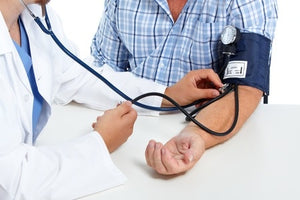Probiotic, Gut Health and Blood Pressure
July 24, 2017

Early studies into beneficial bacteria, known as probiotics, showed the organisms promoted a healthy digestive tract in general. Recent studies confirm these benefits. Other new research show probiotics can positively affect immunity and lower blood cholesterol levels. Now there is evidence that probiotics can help people with high blood pressure.
THE DANGERS OF HIGH BLOOD PRESSURE
Nearly a third of adults living in the United States currently have high blood pressure, according to the Centers for Disease Control and Prevention (CDC). High blood pressure, also known as hypertension, increases the risk for developing dangerous health conditions, such as a heart attack or stroke. In some cases, hypertension can be deadly.
Hypertension is a state where your blood puts too much force against your blood vessels. The excessive force can damage large arteries and delicate capillaries delivering blood to vital organs.
ABOUT BLOOD PRESSURE AND HYPERTENSION
Every beat of your heart forces blood through your arteries. This blood pushes against the walls of the blood vessels that carry it, causing pressure against vessel walls. A health professional measures this pressure during a routine blood pressure check. A normal blood pressure reading means blood is exerting the right amount of pressure against the blood vessels, while a high blood pressure reading means blood is exerting too much pressure. Blood pressure naturally rises and falls throughout the day. It is usually lowest at night and starts to rise before you awaken. Blood pressure typically peaks in the afternoon and drops again in the evening.
Blood pressure even changes as your heart beats. As your heart beats, the muscles of your heart contracts to squeeze blood into the arteries, causing a momentary rise in blood pressure. As heart muscles relax, pressure inside arteries falls.
During a blood pressure check, health professionals measure the pressure inside veins when the heart is mid-beat and when it is relaxed. They refer to the two readings as systolic and diastolic pressures, where systolic is the pressure mid-beat and diastolic is the pressure when your heart is relaxed. Medical professionals discuss the readings as systolic “over” diastolic, and write the measurement as a ratio. In other words, a doctor might describe perfect blood pressure as “120 over 80” and write it as 120/80.
The American Heart Association defines hypertension as blood pressure readings of 140/90 or higher.
WAYS PROBIOTICS CONTROL HYPERTENSION
A number of complex biomedical pathways control blood pressure, but one of the most important is the renin-angiotensin system (RAS). Renin is a protein, also known as a peptide, secreted by the kidneys. Angiotensin is a peptide hormone that narrows arteries. The circulatory system relies on a certain amount of pressure in the veins to work well. RAS works to keep blood pressure high enough. Special cells in the kidneys react to low blood pressure by releasing renin, which goes to the liver and turns into a harmless version of angiotensin. An enzyme, known as Angiotensin Converting Enzyme (ACE), turns harmless angiotensin into the hormone that narrows arteries and increases blood pressure. Probiotics may help reduce blood pressure by stopping the production of ACE.
Probiotics may control hypertension by triggering the production of other compounds known to lower blood pressure. These compounds include conjugated linoleic acid (CLA), small-chain fatty acids (SCFAs), and Gamma-Amino Butyric acid (GABA), a neurotransmitter that communicates messages of relaxation in the central nervous system.
Probiotics may affect blood pressure by simply outnumbering unhealthy bacteria. Researchers in one study noticed that hypertensive lab rats tended to have poorer microbial richness and diversity than lab rats with normal blood pressure.
Beneficial bacteria may also reduce blood pressure by increasing the amount of vitamin D circulating in the body. The body can produce too many cells lining the inside of arteries; cell overgrowth can lead to plaque and narrowing of the arteries. Vitamin D binds to these cells then carries them away. Because of this, vitamin D deficiency may raise the risk for hypertension and increasing vitamin D may reduce blood pressure. Research published in the Journal of Clinical Endocrinology & Metabolism found probiotic supplements increased vitamin D in the blood more than 25 percent.
Researchers in one 2014 study performed a systematic review and meta-analysis of nine studies to learn how probiotics influenced blood pressure. A systematic review answers a specific question by collecting quality studies, while a meta-analysis uses statistics to summarize the results of those studies. The scientists looked at research from nine studies and ultimately concluded that probiotic consumption positively changed systolic and diastolic blood pressure.
Researchers will likely continue making discoveries about the potential health benefits of probiotics. With continued research, widespread health issues like hypertension may someday exist only in medical history books.
The post Probiotic, Gut Health and Blood Pressure appeared first on Natren Probiotics Blog.




Leave a comment